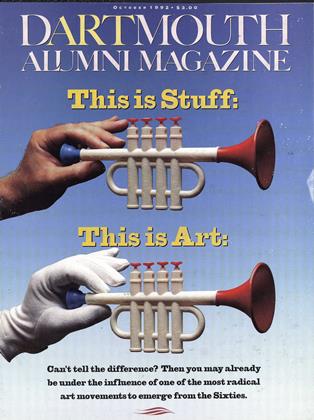"Robert Maynard Hutchins once said that revising the curriculum was the academic equivalent of moving a cemetery
IN FEBRUARY 1991, after more than a year of deliberation, the Ad Hoc Curriculum Review Committee, chaired by Dean of the Faculty James Wright, recommended significant changes in Dartmouth's degree requirements. The faculty has now voted to adopt every one of the recommendations of Dean Wright's committee. The result the most comprehensive overhaul of Dartmouth's degree requirements in perhaps 70 years—is a curriculum that represents a more coherent and rigorous vision of liberal education.
Taken as a whole, the new requirements prescribe what the Dartmouth faculty believes an educated person should have studied as part of a liberal arts education. At the heart of the changes is a shift from requiring students to take four courses in each of the three traditional administrative divisions (humanities, social sciences, natural sciences) to requiring students to take one or more courses in each of eight intellectual fields: Arts Literature Philosophical, Religious, or Historical Analysis International or Comparative Study Social Analysis Quantitative or Deductive Science Natural Science (including a laboratory, experimental, or field component) Technology or Applied Science
These eight categories, in my view, and that of the faculty, represent a more thoughtful description of the principal fields of knowledge and provide a more comprehensive exposure to the most significant modes of inquiry than do our present three divisions.
Because new knowledge in so many fields continues to develop across the lines of established disciplines, the new curriculum will require each Dartmouth undergraduate to take a multidisciplinary or interdisciplinary course taught by two faculty members from different fields. It will also require each student to take three courses in an area called "World Culture"—one course each in the culture, ideas, and institutions of the United States, of Europe, and of a non-Western society.
One of the most important changes is the requirement that all students participate in a culminating or integrating academic activity within their major field of study. As Dean Wright's committee noted, the culminating experience will be "academically challenging and appropriate to the discipline ; it "may involve individual projects (theses, directed
research and writing, laboratory research, creative projects), senior seminar(s), group tutorials or colloquia, or some combination of these." Invariably, the culminating activity will afford students an opportunity to engage in close collaboration with members of the faculty; it will be the intellectual capstone of their undergraduate studies.
Of course, many of the basic graduation requirements did not change. Students must still take 35 courses to graduate. The committee reaffirmed the requirement that students develop proficiency in at least one foreign language. The faculty restated the importance of the Freshman English and the Freshman Seminar requirements, with their emphasis on enhancing our students' writing and composition skills. It also tightened the rules governing modified majors, and it created an optional minor of six or seven courses.
We hope to implement these requirements with the class of 1997, which enters in September 1993. Because the new curriculum will entail additional costs—particularly for the culminating activity, the laboratory requirement, and the interdisciplinary or multidisciplinary requirement—the changes will not go into effect until necessary resources are in hand. The administration and the Board of Trustees are keeping a close eye on the budgetary implications of implementing the new requirements.
Revising a college's curriculum is no easy matter; Robert Maynard Hutchins once said that it was the academic equivalent of moving a cemetery. Dean Wright and his committee colleagues deserve our gratitude for the creative job they did in formulating the proposals. The faculty deserves our respect for deliberating so thoughtfully in adopting the proposals. I am convinced that the new curriculum will do much to enrich the quality of liberal education that Dartmouth offers its students.
 View Full Issue
View Full Issue
More From This Issue
-
 Feature
FeatureTHE LISTENING DEAN
October 1992 -
 Cover Story
Cover StoryThe Stuff of Art
October 1992 By LEE MICHAELIDES -
 Feature
FeatureThe Underground Curriculum
October 1992 By Tim Brookes -
 Article
ArticleThe Lost Season
October 1992 By JIM COLLINS '84 -
 Article
ArticleDid Something Happen in 1492?
October 1992 By William Spengemann -
 Article
ArticleDr. Wheelock's Journal
October 1992 By "E. Wheelock"
James O. Freedman
-
 Cover Story
Cover StoryThe President Makes His Case
FEBRUARY • 1988 By James O. Freedman -
 Article
ArticleMY HEROES
MARCH 1991 By James O. Freedman -
 Article
ArticleTHE HEROIC OUTSIDER
December 1991 By James O. Freedman -
 Article
ArticleThe Freedom That Binds
MAY 1992 By James O. Freedman -
 Article
ArticleEssayists and Solitude
November 1994 By James O. Freedman -
 Article
ArticleSkepticism and the Refined Mind
SEPTEMBER 1996 By James O. Freedman








